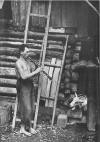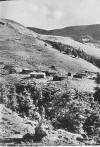UNDER
THE CARPATHIANS
HOME OF A FORGOTTEN PEOPLE
A Hard Life

|
Ivan's Castle in the Air
|
UNDER THE CARPATHIANS HOME OF A FORGOTTEN PEOPLE
A Hard Life |
Churches for Sale
|
 |
Ivan's story is intended to give an impression of the simple and lonely life in the Verchovina soon after the First World War. Its sad ending is a symbol of the dire poverty and plight of Verchovina's fifty odd thousand inhabitants—called Boiki - who had to struggle with the hardships which nature and alien rule had imposed on them. Conditions began to change in 1919, when the Czechoslovak administration took over Carpatho - Ukraine from the Hungarians. But the reforms introduced under the new regime did not take root easily in the remote and secluded Verchovina.
 Life
in the mountains became
even harder during the first years of the country’s new allegiance. The few
barren fields in the narrow valleys, where spring comes
late and where the shadow of the mountain slopes lies till far into the morning
and creeps back in mid—afternoon, have never produced enough to feed the upland
people. For most of them the cultivation of the acre of land which they call
their own has never been more than a subsidiary occupation; and it was so
unprofitable that one-third of the arable land in the Verchovina lay fallow. In
he old days the Boiki used to go to the rich Hungarian plain in the summer
to help with the harvest, returning with sacks of maize and rye.
Life
in the mountains became
even harder during the first years of the country’s new allegiance. The few
barren fields in the narrow valleys, where spring comes
late and where the shadow of the mountain slopes lies till far into the morning
and creeps back in mid—afternoon, have never produced enough to feed the upland
people. For most of them the cultivation of the acre of land which they call
their own has never been more than a subsidiary occupation; and it was so
unprofitable that one-third of the arable land in the Verchovina lay fallow. In
he old days the Boiki used to go to the rich Hungarian plain in the summer
to help with the harvest, returning with sacks of maize and rye.
But unlike their fathers the men of the new generation were unable to do this. The fertile lowland was no longer within reach; overnight it was joined to the far side of newly—drawn frontier which—with its controls and at times even currency restrictions - became a tangible obstacle to the seasonal movement of labour.
This lost source of work and income was only gradually made good by the constructive development of the country’s natural resources. The rational and well-planned forestry work undertaken by the new authorities in the vast tracts of wooded country enabled a large number of the uplanders to earn better wages than in the old days of haphazard exploitation. Then, as time went on, increasing numbers of Ukrainians found seasonal work in various parts of the Czechoslovak Republic, being employed as labourers in the woods, on the farms, in coal mines, in brick kilns and in the building trade, But difficulties were great and progress was bound to be slow. The same is true of the energetic efforts to wipe out illiteracy and to improve the shocking sanitary conditions.
 In
the mountain villages children are often needed to help their parents in field
or farm; thus, whenever there was urgent work to be done at home, they would
stay away from the schools which the Czechs had so amply provided, even though
school attendance. was obligatory in the Republic.
In
the mountain villages children are often needed to help their parents in field
or farm; thus, whenever there was urgent work to be done at home, they would
stay away from the schools which the Czechs had so amply provided, even though
school attendance. was obligatory in the Republic.
And as for hospitals, dispensaries doctors and other such inn ovations of which the authorities strove to combat disease and epidemics—well, in the mountains the witch with her herbs, charms, and potions, was certainly nearer at hand Indeed, for all the progress which the country has made in recent years, superstition is still rampant in the remote villages. Doctors’ pills and concoctions may be good for “foreigners" but a true uplander does not readily believe in them. When he falls ill-and it must be a real illness, for these peasants do not make much fuss—he prefers to call on the local witch, who may put a piece of snake skin on the ailing part of his body and recite a few magic words which are sure to put him on his feet again. It he does not get better then he has probably chosen the wrong witch, for there are good and bad witches. And one never knows what a bad witch may do. She may creep up to a cottage by night and put a spell on the goat, with the result that the goat stops giving milk. This is a serious thing, particularly if the cottager has only one goat; so, if it happens, something has to be done. The peasants have learned in the course of time how to meet the emergency and know the antidote to the evil spell. A tune played on the flute in the evening is, so they say, an unfailing cure.
Besides poverty, squalor, disease, epidemics and evil witches, many areas of this neglected country suffer from yet another scourge—alcohol. The people drink a cheap brand of raw spirit distilled from wood, although its sale for human consumption was forbidden. To a cultivated palate it is revolting, but the peasants indulge in it and will spend their last penny on a glass. They drink to escape from the grim reality of their dreary life, but the respite is short-lived. While much wretchedness can still be found in the Verchovina, there are redeeming features and definite signs of improvement. Primitive and backward though they are, the mountain folk are of sound stock and not without ability. Many of those who emigrated to America have given a good account of themselves; so have those who have had the benefit to the education which was so energetically promoted during the twenty years of Czechoslovak administration.
In the quiet atmosphere of the secluded valleys, separated from each other by vast stretches of forest, peasant art has partly survived. The traditional dress and the geometric patterns of the embroideries vary from village to village and from generation to generation, though they are variations on the same fundamental theme. The designs painted on local pottery, the style of the churches and huts, the patterns carved in wood, show less variety, but, where preserved, they too reveal the artistic inspiration of the native soil. True, compared with the richness and finish of Hucul handiwork, the workmanship of the Verchovina craftsmen is rudimentary and heavy, their decorations simple and rough.
Yet these barren and primitive uplands, the largest settlements of which are little more than huge villages, have preserved certain elements of rural art more carefully than other districts of Carpatho-Ukraine.
Last Update: 03 August 2002